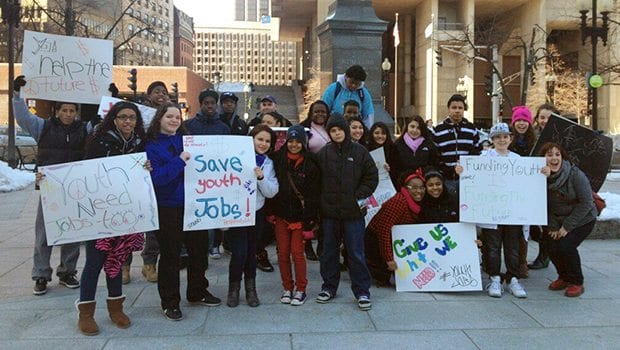
Last month, youth job advocates were put on high alert when the Massachusetts House proposed budget contained cuts in funding for youth job programs, despite a battle to keep the funding. Now the fight turns to the state Senate.
The House’s $36.2 billion state budget proposal is slightly higher than the current fiscal year budget and $191 million less than Gov. Deval Patrick’s proposed 2015 fiscal year budget. The House proposal increases funding for local aid to cities and towns by $25 million over the governor’s proposal, with a $61 million boost to education through the community college and state university systems.
However, the House budget savings come at the expense of six youth jobs and violence prevention programs, cutting $13.5 million in funding from them. The cuts make the youth jobs situation even more dire considering most of these programs have traditionally received supplemental funding throughout the year just to keep running. Youth job advocates say the cuts could cost as many as 1,000 summer jobs.
In the House, state reps fought to stave off the cuts with several amendments filed to restore much of the funding, but the House leadership refused to consider them.
State Sen. Sonia Chang-Diaz said that losing funding for youth jobs and violence prevention programs is a big concern for her and she hopes to keep the funding in the budget to back them.
“Certainly these line items are hugely important to me and hugely important to the district I represent,” Chang-Diaz said. “I will certainly be fighting really hard for these.”
Chang-Diaz points out that last year the Senate proposed more funding for youth job and violence prevention programs, so there is hope that something similar will happen this year.
A big challenge, according to Chang-Diaz, is that while many people think the state has recovered from the recession there are still many areas covered by the budget that have not recovered and these areas are forcing budget cuts in programs, including those for youth jobs, that have proven their worth.
“It is extremely frustrating. It is frustrating for me, as a legislator, that we have to fight for this every year,” she said.
The Boston-based Youth Jobs Coalition has been at the heart of the fight for funding. It is composed of 40 youth and community groups from across Massachusetts that work together to create more employment opportunities for teens. The coalition has helped secure over $50 million of funding for youth jobs since the organization was started in 2009. Every year, youth coalition members come together to meet with legislators and propose spending in Massachusetts budget line items that support youth jobs.
On April 29, the Youth Jobs Coalition descended on the State House in a show of force to back more funding for youth job programs. Another rally is planned for May 20.
The coalition is asking for funding for its MAWORK4TEENS Legislative Package, which includes $9.5 million for The Safe and Successful Youth Initiative, $12 million for Youth Works and $5 million for School to Career. These programs cover jobs for struggling teens, jobs in the community and private sector jobs.
“I want to encourage the advocates to keep it up,” Chang-Diaz said. “We have to keep that hope so that people still keep making their voices heard. Everybody else is up here pulling for their line item. The minute that people stop pulling for theirs, that is when we start to lose.”
Mayor Martin Walsh’s administration has pledged its support as well.
“The City of Boston has a robust program to put youth to work year-round, especially during the summer months,” said the mayor’s spokeswoman Gabrielle Farrell. “Our efforts bring together public, private, and nonprofit sectors to provide meaningful employment for Boston youth, and the state financial support is a vital component of this collaborative effort. State funding is a critical piece to leveraging youth jobs and providing a productive, enriching, and safe summer for our youth. The mayor is continuing to work with legislative partners to ensure there is sufficient funding in Fiscal Year 2015 for youth programming,”
Vanessa Snow, manager of organizing and policy initiatives for Hyde Square Task Force, cautions against thinking that the youth job programs are simply about giving teens something to do during the summer or to give them a little extra money in their pocket with after-school work. She says the programs provide employment opportunities to teens who are really contributing to their households.
“A lot of them support their families,” Snow said.
Snow says it is unfortunate to face cuts in funding for youth job programs considering there is an increasing need for state-funded programs as jobs in the service sector — a traditional well of youth employment opportunities — become less and less available to teens.
The trend sees teens turning to community organizations, such as the Hyde Square Task Force, for work experience, according to Snow. But these community organizations are often dependent on state funding.
Hyde Square Task Force employs about 100 youth throughout the course of the year and, while it relies on a variety of sources for funding, state grants contribute significantly. Snow said her organization will turn elsewhere if the state funding does not come through.
“In order for us to meet our goal of trying to provide a stipend for the 100 youth who work for us we have to scramble around to find the funding,” Snow said. “But not every organization has the capacity to do that type of fundraising while still being dedicated to delivering quality programs.”
She also said Hyde Square Task Force will work with the Youth Jobs Coalition to engage state Senators and advocate against budget cuts to youth job funding, as it did with state Representatives.






